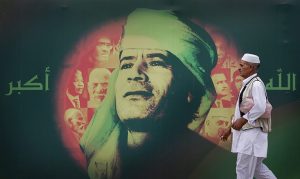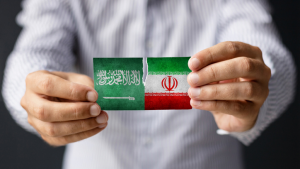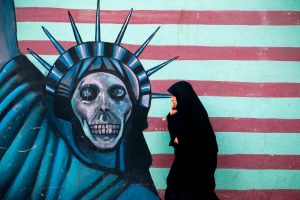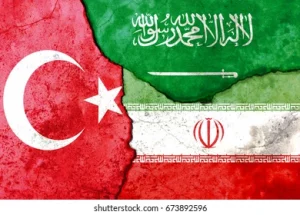Emir Hadzikadunic || 28 April 2022
International level and Islamic related constraints on foreign policymaking

Realists pay little attention to human or domestic factors in foreign policy analysis and focus instead on states as unitary and rational actors who primarily act to survive in the anarchic international system. Structural realists, for example, underline the balance of threat among states as the major reference point.[1] As such, it is expected that statesmen will behave in accordance with limits imposed by external attributes such as power distribution, regional order, or other factors that emanate outside of national borders. Statesmen from Muslim majority states should not act differently in this regard. Whatever their guiding Islamic ideology, whatever their domestic makeup, and no matter what Islamic ideas and cognitive beliefs shadow the minds of their foreign policymakers, Muslim states are also constrained by the anarchic nature of their wider international environment.
Nevertheless, international realities occasionally interact with domestic pressures. Some even contend that Islam has emerged with a ‘political profile’ to the international scene.[2] As Reza Simber argues, “we cannot understand the politics of the Middle East without some reference to it.”[3] “If Islam is driving force behind political phenomenon”, according to him, “it must also have a role in international politics.”[4] In terms of Islam and international relations, according to Maurits Berger, the year 1979 was a turning point. “A post-colonial period where socialism and secularism had reigned dominantly in the Muslim world was abruptly ended, and a new period started where the forces of Islam – religiously, politically and ideologically – gained momentum.”[5]
International level of analysis is only about the great power politics. This discussion may, therefore, focus only on powerful Muslim states that merge religion with national interests or merge Islam with rules of balancing behavior. On some occasions, these states seem to have incorporated Islam as an effective tool to pursue their external goals and agendas. In this regard, we may discuss how Saudi Arabia as a status quo power boosted Islamic unity and solidarity to address external challenges faced by revisionist powers in the system in the mid-60s, how Iran after the Iranian revolution combined revolutionary Islam and regime interest to promote its influence abroad or even challenge dominant powers in the system, or how Turkey combined Othman Islamic heritage and national interest to expand its strategic depth in its neighborhood.
 There are times, particularly in the wake of great systemic or sub systemic changes, when a nation-state may encounter profound uncertainty on this point.[6] For example, Pan-Arabism and its commitment to revolutions throughout the Middle East was an attempt by Egypt and few other countries to make serious changes in the regional subsystem. Nasser overthrew the Egyptian monarchy in 1952 already and pledged ever since to oppose the remaining monarchies who were “self-serving tools of foreign interests”.[7] It is well known that threatened Muslim states, such as the Kingdom of Saudi Arabia, opposed the secular nature of revisionist powers and their commitments to radicalism and revolutions. However, to encounter a profound external uncertainty, Saudi Arabia promoted a powerful idea of Islamic unity and solidarity. For example, it founded the Muslim World League (Rabtiah al-‘Alam al-Islami) in 1962. By 1965, then-King Faisal had also emerged as a serious contender to Nasser and the Ba’athists by using Pan-Islamism as a foreign policy tool; specifically, he advocated an “Islamic Entente” after the failure of the Jeddah Agreement designed to bring peace to Yemen.[8] Without being sidetracked by the Islamic rhetoric, one can easily unwrap new ideas of Islamic unity and solidarity and interplay them with the rules of balancing behavior. Thus, Saudi Arabia acted rationally for the purpose of counter-balancing Egypt and for a display of its status as a spiritual leader in the Islamic world.[9]According to Wilson and Graham, King Faisal’s response to Nasserism was to advocate Muslim solidarity in an attempt to promote Saudi Arabia’s role as the cradle of Islam and protectorate of the Muslim cause.[10]Saudi King also perceived Islam as the source of Arab advancement as a people and civilization according to Adel Altoraifi. Therefore, Islamic unity would empower Arab unity and would serve Arab interests at the international level.[11] Sullivan also found the explanation in the nature of the Arab state system and the challenge posed by Cairo rather than in the style of Saudi Arabia or its leader, King Faisal.[12] Later, Saudi Arabia and Egypt reconciled their relations because Egypt suffered a disaster in the third Arab-Israel War of 1967 and urgently needed Saudi Arabian economic aid. Since then, Saudi Arabia has repeatedly emphasized the significance of its leadership in religious affairs and converted it into its diplomatic tool to expand its influence in the Islamic world.[13]
There are times, particularly in the wake of great systemic or sub systemic changes, when a nation-state may encounter profound uncertainty on this point.[6] For example, Pan-Arabism and its commitment to revolutions throughout the Middle East was an attempt by Egypt and few other countries to make serious changes in the regional subsystem. Nasser overthrew the Egyptian monarchy in 1952 already and pledged ever since to oppose the remaining monarchies who were “self-serving tools of foreign interests”.[7] It is well known that threatened Muslim states, such as the Kingdom of Saudi Arabia, opposed the secular nature of revisionist powers and their commitments to radicalism and revolutions. However, to encounter a profound external uncertainty, Saudi Arabia promoted a powerful idea of Islamic unity and solidarity. For example, it founded the Muslim World League (Rabtiah al-‘Alam al-Islami) in 1962. By 1965, then-King Faisal had also emerged as a serious contender to Nasser and the Ba’athists by using Pan-Islamism as a foreign policy tool; specifically, he advocated an “Islamic Entente” after the failure of the Jeddah Agreement designed to bring peace to Yemen.[8] Without being sidetracked by the Islamic rhetoric, one can easily unwrap new ideas of Islamic unity and solidarity and interplay them with the rules of balancing behavior. Thus, Saudi Arabia acted rationally for the purpose of counter-balancing Egypt and for a display of its status as a spiritual leader in the Islamic world.[9]According to Wilson and Graham, King Faisal’s response to Nasserism was to advocate Muslim solidarity in an attempt to promote Saudi Arabia’s role as the cradle of Islam and protectorate of the Muslim cause.[10]Saudi King also perceived Islam as the source of Arab advancement as a people and civilization according to Adel Altoraifi. Therefore, Islamic unity would empower Arab unity and would serve Arab interests at the international level.[11] Sullivan also found the explanation in the nature of the Arab state system and the challenge posed by Cairo rather than in the style of Saudi Arabia or its leader, King Faisal.[12] Later, Saudi Arabia and Egypt reconciled their relations because Egypt suffered a disaster in the third Arab-Israel War of 1967 and urgently needed Saudi Arabian economic aid. Since then, Saudi Arabia has repeatedly emphasized the significance of its leadership in religious affairs and converted it into its diplomatic tool to expand its influence in the Islamic world.[13]
The in-depth historical account of diplomatic relations between Iran and Saudi Arabia also points to a systemic recurrence of their friendlier behavior at the time. It is because Iran and Saudi Arabia in their common subsystem feared their rivals among Arab nationalists, socialists, or communists far more than they feared each other. This fear was great enough that it not only drew Saudi Arabia, a Wahhabi Islamist state, and Iran, then a nationalist and pro-secular Shia state, together, but also made them more receptive to Islamic political movements, such as the Muslim Brotherhood.[14] As Iran and Saudi Arabia accepted American dominance in the international system, they complemented each other and set aside the sectarian divide. The strength of their collaboration in the 1950s was expressed in different arenas, such as converging Saudi-Iranian interests in Egypt after Gamal Abdel Nasser overthrew King Farouk in the socialist-republican coup; joint support for Jordan when revolts threatened the continuity of the Hashemite monarchy in 1958; and preventing a socialist coup in Lebanon in 1958. In the 1960s, Iran and Saudi Arabia founded the Organization of Islamic Cooperation with other Muslim states and established the Arab–Iranian Friendship Organization. Iran also supported Saudi Arabia in a proxy war against Egypt in Northern Yemen from 1962 to 1965. When King Faisal turned for help to the Shah to counter south Yemen’s air raids in Saudi Arabia in 1969, Shah ordered round-the-clock flights for two days to deliver military equipment. In the 1970s, two states exchanged high-level visits, contained Iraq’s aggressive aspirations, and supported other pro-Western governments, such as Oman, against internal revolutionary elements. It is also illustrative that Iran declared a week of mourning when King Faisal was assassinated in 1975.[15]
 However, when Iran departed from their shared order and contested the status of the Saudi state in the regional subsystem or confronted an old Saudi monarchy’s claim to the leadership of the Muslim world, Saudi’s vision of the role of religion in the foreign policy has revised as well. Two choices were presented to Saudi authorities according to Abir Mordechai. The first was to moderate the state, revising the strict Wahhabi practice advocated by senior ulama’. The second choice entailed pursuing a more conservative religious path. The Saudi policy-makers would decide to take the latter option, embarking on a campaign to promote Wahhabi Islam in the face of Shi’ite expansionism at home and abroad.[16] As Nevo Joseph argues, ‘By employing religion for this purpose, the Saudi monarchy has actually availed itself of Islam to change the situation in which religion constitutes the predominant provider of the regime’s legitimacy.’[17] It was also a policy that would make Saudi Arabia the leading Arab country to instrumentally employ Sunni political Islamic movements – such as the Egypt-based Muslim Brotherhood International Organization – as a shield against its political opponents in the system.[18] Saudi strategic interest at the time combined two segments according to WU Yungui. The first was to construct a defense barrier of Sunni Muslims that can effectively obstruct the surging expansion of Shiite-dominated Iran. The second was to seek an appropriate agent of its own strategic interest in Central Asia through its support and assistance to some specific factions or groups of Afghanistan’s Mujahedeen, including the Taliban, who later seized Afghan’s national regime.[19] By logic of structural realism, Saudi Arabia also sought to balance perceived Iranian threat by expanding its own military and economic capabilities.[20]
However, when Iran departed from their shared order and contested the status of the Saudi state in the regional subsystem or confronted an old Saudi monarchy’s claim to the leadership of the Muslim world, Saudi’s vision of the role of religion in the foreign policy has revised as well. Two choices were presented to Saudi authorities according to Abir Mordechai. The first was to moderate the state, revising the strict Wahhabi practice advocated by senior ulama’. The second choice entailed pursuing a more conservative religious path. The Saudi policy-makers would decide to take the latter option, embarking on a campaign to promote Wahhabi Islam in the face of Shi’ite expansionism at home and abroad.[16] As Nevo Joseph argues, ‘By employing religion for this purpose, the Saudi monarchy has actually availed itself of Islam to change the situation in which religion constitutes the predominant provider of the regime’s legitimacy.’[17] It was also a policy that would make Saudi Arabia the leading Arab country to instrumentally employ Sunni political Islamic movements – such as the Egypt-based Muslim Brotherhood International Organization – as a shield against its political opponents in the system.[18] Saudi strategic interest at the time combined two segments according to WU Yungui. The first was to construct a defense barrier of Sunni Muslims that can effectively obstruct the surging expansion of Shiite-dominated Iran. The second was to seek an appropriate agent of its own strategic interest in Central Asia through its support and assistance to some specific factions or groups of Afghanistan’s Mujahedeen, including the Taliban, who later seized Afghan’s national regime.[19] By logic of structural realism, Saudi Arabia also sought to balance perceived Iranian threat by expanding its own military and economic capabilities.[20]
In the case of Iran, individual, domestic, and international incentives interplayed and reinforced each other in the wake of the 1979 Islamic Revolution. Driven by Khomeini’s own religious zeal at the individual level, new Islamic constitutional doctrines at the domestic level, the Islamic Republic of Iran declared and pursued daring and challenging foreign policy objectives in the regional subsystem. The essence of Iranian foreign policy toward the United States became defiance and challenge of its presence, and its principal objective: the demonstration of US impotence to stem the rising tide of Islam.”[21] Khomeini also vowed to fight “the Great Satan until the absolute annihilation of its interests in that part of the world.”[22] As the structural theory holds, the introduction of a new threat to the existing order will result in a change to the status quo, and this turning point arrived on 4 November 1979, when 52 American diplomats were taken hostage at the US Embassy in Tehran. With this act, in addition to efforts to consolidate clerical rule domestically, the Islamic Republic of Iran also abandoned its alliance with the Americans, one that was shared with Saudi Arabia. It is not coincidental that in that same month, sectarian riots in the Saudi eastern province of Al-Sharghiya erupted. It was also during this time that Ayatollah Khomeini argued that “…the Islamic world must turn to Iran’s leadership to win its freedom and independence”.[23] In addition to opposing American military presence in the sub-system, Tehran also ignored the Soviet pole, initiating a new foreign policy – “Neither East, nor West – but the Islamic Republic!” The Soviet Union was just “the lesser Satan whose godless communist ideology was abhorrent.”[24] Iran also withdrew from its formal alliances with Turkey within the Central Treaty Organization (CENTO) that included United States, United Kingdom, and Pakistan and attempted to isolate itself from the international system. Turkey remained a NATO member, serving “US regional interests,” whose commitment to secular nationalism was “anathema to” Iran’s “ideology of Islamic revolutionary universalism”.[25] Within CENTO, Pakistan was one of the only nations with which Khomeini honored the previous regime’s formal relations.[26]In this respect, Islamic Republic showed little sensitivity to the limits imposed by the international system.[27]
 However, some argued that Iranian foreign policy in the post-revolutionary stage, despite its professedly Islamic orientation, was predominantly motivated by realpolitik.[28] For Kruse, “neither domestic politics, composition of the political elite, nor regime made any difference.” He contends that “Iran engaged in balancing behaviour, allying with Syria, a secular state based on Arab nationalism,” abandoned its initial efforts “to isolate itself from the international system and sought arms from its most repugnant ideological enemies, the US, Israel and the Soviet Union,” when confronted with the Iraqi invasion.[29] Iranian adaptive behaviour in the system happened on many other occasions. For example, as American military intervened in Afghanistan and removed Taliban from power in 2002, Iranian diplomats gave an essential contribution in the formulation of the post-Taliban government of Hamid Karzai. According to James Dobbins – the US special envoy to Afghanistan and America’s senior official at the talks – no delegation was more helpful.[30]
However, some argued that Iranian foreign policy in the post-revolutionary stage, despite its professedly Islamic orientation, was predominantly motivated by realpolitik.[28] For Kruse, “neither domestic politics, composition of the political elite, nor regime made any difference.” He contends that “Iran engaged in balancing behaviour, allying with Syria, a secular state based on Arab nationalism,” abandoned its initial efforts “to isolate itself from the international system and sought arms from its most repugnant ideological enemies, the US, Israel and the Soviet Union,” when confronted with the Iraqi invasion.[29] Iranian adaptive behaviour in the system happened on many other occasions. For example, as American military intervened in Afghanistan and removed Taliban from power in 2002, Iranian diplomats gave an essential contribution in the formulation of the post-Taliban government of Hamid Karzai. According to James Dobbins – the US special envoy to Afghanistan and America’s senior official at the talks – no delegation was more helpful.[30]
Turkey faced different external realities in different phases and Islam as a reference point expectedly played different roles. During the Cold War, Turkish state followed “a strictly Western orientation in foreign policy, leaving almost no space for religion.” At the same time, security concerns and the Soviet threat have denied Islam “any space, even in cultural terms.”[31] However, toward the end of the bipolar world, and especially after the end of the Cold War, Ankara began to interplay the assets of its geography, historical legacy and religion. As argued, this transformation also hinges upon a growing embrace of the philosophy of neo-Ottomanism.[32] For example, then prime minister and later president Turgut Ozal popularized Ottoman heritage both domestically and in Turkish neighborhood. Then Prime minister Tansu Çiller gave Turkey the essential status in the world by promoting it as a model country among 52 Muslim states. Interestingly, in the interview for PBS in 1995, she compared Turkey with the Iranian model as the remaining option for Muslim countries.[33] Islamic reference and geopolitics strongly interplayed with the premiership of Necmettin Erbakan (1996-97), at least rhetorically. He went as far as to call for the creation of an Islamic version of the North Atlantic Treaty Organization. Given new international circumstances and the boost provided by a potent leadership of Justice and Development Party (AKP), Turkish foreign policy reached out to previously neglected regions such as the Balkans, the Middle East, the South Caucasus and even wider areas in Asia and Africa. This foreign policy shift was on a much bigger scale a part of a new doctrine that Ahmet Davutoğlu had alreadyproposed academically as a viable Turkish grand strategy. According to the intellectual who soon after served as chief adviser to Prime Minister Recep Tayyip Erdogan (2003-2009), Turkish foreign minister (2009-2014), and finally prime minister (2014-2016), Turkey possesses “strategic depth” which allows it to implement a pro-active and multi-dimensional foreign policy and claim a central role in international politics. “Instead of letting other countries use Turkey to promote their regional and global strategic role, Turkey should develop a proactive policy commensurate to its historic and geographic depth, which is amplified by its Ottoman legacy.”[34] Davutoğlu argued that “Turkey is the natural heir to the Ottoman Empire that once unified the Muslim world and therefore has the potential to become a Muslim regional power.”[35] Even though he no longer serves in the government, his foreign policy discourse – conceptual repertoire and geographically prominent areas from Turkey’s strategic depth – remain untouched with new Turkish governments.[36]
 Position, status, and foreign policy behavior of Saudi Arabia, Islamic Republic of Iran, and Turkey in the international system has clearly demonstrated that Islam is not completely isolated from their security dilemmas. Considering their centrality, each of them has attempted to expand its influence by promoting common Islamic heritage in their neighborhood. By extension, attached smaller states with common religious values would strengthen center’s capability, build closer friendships, possibly build alliances. This chapter also implies three models of Islamic leadership – Saudi, Iranian and Turkish – each inspired by its own historical heritage and rationalized by its own geography and balancing behavior.
Position, status, and foreign policy behavior of Saudi Arabia, Islamic Republic of Iran, and Turkey in the international system has clearly demonstrated that Islam is not completely isolated from their security dilemmas. Considering their centrality, each of them has attempted to expand its influence by promoting common Islamic heritage in their neighborhood. By extension, attached smaller states with common religious values would strengthen center’s capability, build closer friendships, possibly build alliances. This chapter also implies three models of Islamic leadership – Saudi, Iranian and Turkish – each inspired by its own historical heritage and rationalized by its own geography and balancing behavior.
Endnotes:
[1] Kenneth N. Waltz, Theory of International Politics, (New York: McGraw-Hill, 1979), 102–12
[2] Reza Simber, “Political Islam and International System: Impacts and Implications,” Journal of International Area Studies, Volume 16, Number 2, (2009): 107.
[3] Ibid., 119.
[4] Ibid., 107.
[5] Berger, Religion and Islam in Contemporary International Relations, 1.
[6] Hudson, Foreign Policy Analysis, Classic and Contemporary Theory, 105.
[7] R. B. Reppa, Sr., Israel and Iran Bilateral Relations and Effect on the Indian Ocean Basin, (NY: Praeger, 1974), 92.
[8] Robert R. Sullivan, “Saudi Arabia in International Politics,” The Review of Politics 32.4 (1970): 439.
[9] Yungui, “The Influence of Islam over the Foreign Policies of Contemporary Islamic Countries,” 4-5.
[10] Peter W. Wilson and Douglas Graham, Saudi Arabia: The Coming Storm, (Armonk, NY: M. E. Sharpe, 1994), 98.
[11] Altoraifi, “Understanding the Role of State Identity in Foreign Policy Decision…,” 119.
[12] Sullivan, “Saudi Arabia in International Politics,” 440; See also: Altoraifi, “Understanding the Role of State Identity in Foreign Policy Decision…,” 118.
[13] Yungui, “The Influence of Islam over the Foreign Policies of Contemporary Islamic Countries,” 4-5.
[14] Emir Hadzikadunic, “Iran-Saudi Ties: Can History Project Their Trajectory?,” Insight 2015, Middle East Institute, National University of Singapore, (2019), page 5, accessed January 20: 2021 https://mei.nus.edu.sg/wp-content/uploads/2019/10/Insight-215-Saudi-Iranian-Ties.pdf
[15] Hadzikadunic, “Iran-Saudi Ties: Can History Project Their Trajectory?,” 5.
[16] Mordechai Abir, Saudi Arabia: Government, Society, and the Gulf Crisis, (London:
Routledge, 1993), 13.
[17] Joseph Nevo, “Religion and National Identity in Saudi Arabia,” Middle Eastern Studies 34.3 (1998): 34.
[18] Oliver Roy, Antoine Sfeir and John King, The Columbia World Dictionary of Islamism, (New York: Columbia University Press, 2007), 290.
[19] Yungui, “The Influence of Islam over the Foreign Policies of Contemporary Islamic Countries,” 3-4
[20] Kruse, “Determinants of Iranian Foreign Policy: The Impact of Systemic, Domestic…,” 104.
[21] Hunter, Iran and the World, Continuity in a Revolutionary decade, 59. See also: Kruse, “Determinants of Iranian Foreign Policy: The Impact of Systemic, Domestic and Ideological Factors,” 70.
[22] David Menashri, Iran, a Decade of Revolution, New York and London: Holmes and Meier, 1990, p. 205.
[23] Parsi, T. Treacherous Alliance: The Secret Dealings of Israel, Iran, and the United States. New Haven: Yele Univ., 2007.
[24] Kruse, “Determinants of Iranian Foreign Policy: The Impact of Systemic, Domestic…,” 78-79.
[25] Hunter, Iran and the World, Continuity in a Revolutionary decade, 134.
[26] Kruse, “Determinants of Iranian Foreign Policy: The Impact of Systemic, Domestic…,” 95.
[27] Stephen Walt, Revolution and War, Ithaca, NY: Cornell University Press, 1996, 264.
[28] Ozkan and Chatterjee, “Islamic Values in Foreign Policy…,” 116.
[29] Kruse, “Determinants of Iranian Foreign Policy: The Impact of Systemic, Domestic…,” v.
[30] D. Murray, US Foreign Policy and Iran, American – Iranian relations since the Islamic revolution, (Routledge, 2010), 122.
[31] Ozkan and Chatterjee, “Islamic Values in Foreign Policy…,” 117.
[32] Alexander Murinson, “The Strategic Depth Doctrine of Turkish Foreign Policy,” Middle Eastern Studies 42, no. 6 (2006): 945, accessed March 10, 2021: http://www.jstor.org/stable/4284512.
[33] Interview with PBS (Public Broadcasting Company, USA), 18 April 1995., See: Kesgin, “Tansu Çiller’s Leadership Traits and Foreign Policy,” 42.
[34] Ioannis, Grigoriadis, The Davutoglu Doctrine and Turkish Foreign Policy, Hellenic Foundation for European and Foreign Policy, Working Paper No-8, 1-12, 2010.
[35] Walker, “Learning Strategic Depth: Implications of Turkey’s New Foreign Policy Doctrine,” 33-34.
[36] Bezen Balamir Coskun, “The Post-Davutoglu Era in Turkish Foreign Policy,” E-International Relations, June 3, 2016, accessed March 10, 2021, https://www.e-ir.info/2016/06/03/the-post-davutoglu-era-in-turkish-foreign-policy/
 Dr Emir Hadzikadunic is a Senior Research Fellow at the Islamic Renaissance Front. He holds a PhD in International Relations from the International University of Sarajevo and was the Ambassador of Bosnia and Herzegovina to the Islamic Republic of Iran (2010-2013) and Malaysia (2016-2020). He is currently a Distinguished Fellow at Faculty of Administrative Science & Policy Studies, Universiti Teknologi MARA (UiTM) Malaysia. This essay also appears on Context: Journal of Interdisciplinary Studies at https://cns.ba/contextojs/index.php/context
Dr Emir Hadzikadunic is a Senior Research Fellow at the Islamic Renaissance Front. He holds a PhD in International Relations from the International University of Sarajevo and was the Ambassador of Bosnia and Herzegovina to the Islamic Republic of Iran (2010-2013) and Malaysia (2016-2020). He is currently a Distinguished Fellow at Faculty of Administrative Science & Policy Studies, Universiti Teknologi MARA (UiTM) Malaysia. This essay also appears on Context: Journal of Interdisciplinary Studies at https://cns.ba/contextojs/index.php/context

